 W
WThe Amateur Gentleman is a 1936 British drama film directed by Thornton Freeland and starring Douglas Fairbanks Jr., Elissa Landi, Gordon Harker and Margaret Lockwood, with music by Richard Addinsell. It is based on the 1913 novel The Amateur Gentleman by Jeffery Farnol. In an effort to prove his father's innocence of a charge of stealing, a young man disguises himself as a gentleman and travels to Regency London.
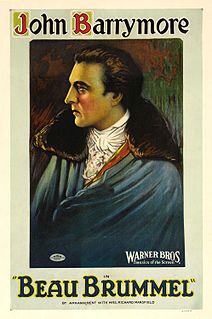 W
WBeau Brummel is a 1924 American silent film historical drama starring John Barrymore and Mary Astor. The film was directed by Harry Beaumont and based upon Clyde Fitch's 1890 play, which had been performed by Richard Mansfield, and depicts the life of the British Regency dandy Beau Brummell.
 W
WBeau Brummell is a 1954 American-British historical film released by Metro-Goldwyn-Mayer. It was directed by Curtis Bernhardt and produced by Sam Zimbalist from a screenplay by Karl Tunberg, based on the 1890 play Beau Brummell by Clyde Fitch. The play was previously adapted as a silent film made in 1924 and starring John Barrymore as Beau Brummell, Mary Astor, and Willard Louis as the Prince of Wales.
 W
WBeau Brummell: This Charming Man is a 2006 BBC Television drama based on the biography of Beau Brummell by Ian Kelly. The title references a 1983 song by The Smiths.
 W
WBecky Sharp is a 1935 American historical drama film directed by Rouben Mamoulian and starring Miriam Hopkins who was nominated for the Best Actress Oscar. Other supporting cast were William Faversham, Frances Dee, Cedric Hardwicke, Billie Burke, Alison Skipworth, Nigel Bruce, and Alan Mowbray.
 W
WBlackadder the Third is the third series of the BBC sitcom Blackadder, written by Richard Curtis and Ben Elton, which aired from 17 September to 22 October 1987. The series is set during the Georgian Era, and sees the principal character, Mr. E. Blackadder, serve as butler to the Prince Regent and have to contend with, or cash in on, the fads of the age embraced by his master.
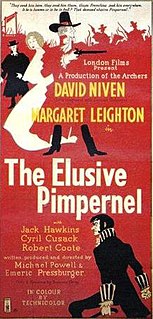 W
WThe Elusive Pimpernel is a 1950 British period adventure film by the British-based director-writer team of Michael Powell and Emeric Pressburger, based on the novel The Scarlet Pimpernel (1905) by Baroness Emmuska Orczy. It was released in the United States under the title The Fighting Pimpernel. The film stars David Niven as Sir Percy Blakeney, Margaret Leighton as Marguerite Blakeney and features Jack Hawkins, Cyril Cusack and Robert Coote. Originally intended to be a musical, the film was re-worked as a light-hearted drama.
 W
WThe First Gentleman is a 1948 British historical drama film directed by Alberto Cavalcanti, and starring Jean-Pierre Aumont, Joan Hopkins, and Cecil Parker. It portrays the relationships and marriage of George, Prince Regent and his tense dealings with other members of his family such as his only child Princess Charlotte and his younger brother Frederick, Duke of York. It was also released as Affairs of a Rogue.The film is based on a play, The First Gentleman by Norman Ginsbury, which was staged in London in 1945, starring Robert Morley as the Prince Regent and Wendy Hiller as Princess Charlotte.
 W
WGeorge is a supporting character who appeared in various adaptations of the BBC sitcom Blackadder, played by Hugh Laurie. Each series saw a different incarnation of the character, because each was set in a different period of history. He was most prominently featured in the third and fourth series. The character was added to the series as a replacement for the Lord Percy Percy character, who did not appear in the third instalment because Tim McInnerny, the actor playing him, feared being typecast.
 W
WThe House of Rothschild is a 1934 American pre-Code film written by Nunnally Johnson from the play by George Hembert Westley, and directed by Alfred L. Werker. It chronicles the rise of the Rothschild family of European bankers.
 W
WKitty is a 1945 film, a costume drama set in London during the 1780s, directed by Mitchell Leisen, based on the novel of the same name by Rosamond Marshall, with a screenplay by Karl Tunberg. It stars Paulette Goddard, Ray Milland, Constance Collier, Patric Knowles, Reginald Owen, and Cecil Kellaway as the English painter Thomas Gainsborough. In a broad interpretation of George Bernard Shaw's Pygmalion, the film tells the rags-to-riches story of a beautiful young cockney guttersnipe who is given a complete makeover by an impoverished aristocrat (Milland) and his aunt (Collier) in hopes of arranging her marriage to a peer, thereby repairing their fortunes and their social status.
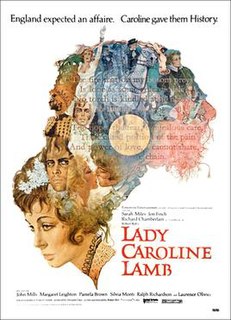 W
WLady Caroline Lamb is a 1972 British epic romantic drama film based on the life of Lady Caroline Lamb, lover of Lord Byron and wife of William Lamb, 2nd Viscount Melbourne. The only film written and directed by Robert Bolt, it starred his wife, Sarah Miles, as Lady Caroline, Jon Finch, Richard Chamberlain, Laurence Olivier, Ralph Richardson, John Mills, Margaret Leighton and Michael Wilding.
 W
WLady Hamilton is a 1921 German silent historical film directed by Richard Oswald and starring Liane Haid, Conrad Veidt and Werner Krauss. The film depicts the love affair between the British Admiral Lord Nelson and Lady Emma Hamilton. It was based on two novels by Heinrich Vollrath Schumacher.
 W
WThe Madness of King George is a 1994 British biographical historical comedy-drama film directed by Nicholas Hytner and adapted by Alan Bennett from his own 1991 play, The Madness of George III. It tells the true story of George III of Great Britain's deteriorating mental health, and his equally declining relationship with his eldest son, the Prince of Wales, particularly focusing on the period around the Regency Crisis of 1788–89. Modern medicine has suggested that the King's symptoms were the result of acute intermittent porphyria, although this theory has been vigorously challenged, most notably by a research project based at St George's, University of London, which concluded that George III did actually suffer from mental illness after all.
 W
WThe Man in Grey is a 1943 British film melodrama made by Gainsborough Pictures, and is considered as the first of its "Gainsborough melodramas". It was directed by Leslie Arliss and produced by Edward Black from a screenplay by Leslie Arliss and Margaret Kennedy, adapted by Doreen Montgomery from the novel The Man in Grey by Eleanor Smith. The film's sets were designed by Walter Murton.
 W
WMrs. Fitzherbert, also known as Princess Fitz and A Court Secret, is a rarely seen 1947 British historical drama film directed by Montgomery Tully and starring Peter Graves, Joyce Howard and Leslie Banks. It depicts the relationship between George IV and Maria Fitzherbert. It is an adaptation of the 1945 novel Princess Fitz by Winifred Carter
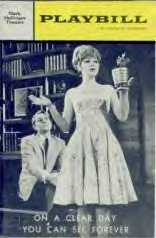 W
WOn a Clear Day You Can See Forever is a musical with music by Burton Lane and a book and lyrics by Alan Jay Lerner based loosely on Berkeley Square, written in 1926 by John L. Balderston. It concerns a woman who has ESP and has been reincarnated. The musical received three Tony Award nominations.
 W
WPrincess Caraboo is a 1994 American historical comedy-drama film co-written and directed by Michael Austin, based on the real-life 19th-century character Princess Caraboo, who passed herself off in British society as an exotic princess who spoke a strange foreign language; she is portrayed by Phoebe Cates.
 W
WThe Return of the Scarlet Pimpernel is a 1937 British thriller film directed by Hanns Schwarz and starring Barry K. Barnes, Sophie Stewart, Margaretta Scott and James Mason. It is a sequel to the 1934 film The Scarlet Pimpernel based on the stories by Baroness Emmuska Orczy.
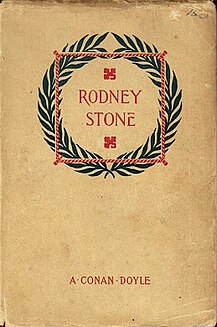 W
WRodney Stone is a Gothic mystery and boxing novel by Scottish writer Sir Arthur Conan Doyle first published in 1896.
 W
WA Royal Scandal is a 1996 British television docudrama produced and directed by Sheree Folkson. The teleplay by Stanley Price focuses on the ill-fated marriage of George IV and Duchess Caroline of Brunswick. Dialogue from actual historical records reveals how each party tries to humiliate the other, causing the monarchy to suffer great embarrassment. Narrated by Ian Richardson, the drama was broadcast by the BBC.
 W
WThe Scarlet Pimpernel is a 1934 British adventure film directed by Harold Young and starring Leslie Howard, Merle Oberon, and Raymond Massey. Based on the 1905 play by Baroness Orczy and Montagu Barstow and the classic 1908 adventure novel by Baroness Orczy, the film is about an eighteenth-century English aristocrat who leads a double life, appearing as an effete aristocrat while engaged in an underground effort to free French nobles from Robespierre's Reign of Terror. The film was produced by Alexander Korda.
 W
WThe Scarlet Pimpernel is the first novel in a series of historical fiction by Baroness Orczy, published in 1905. It was written after her stage play of the same title enjoyed a long run in London, having opened in Nottingham in 1903.
 W
WThe Scarlet Pimpernel is a series of television drama programmes loosely based on Baroness Emmuska Orczy's series of novels, set during the French Revolution.
 W
WShaka Zulu is a 1986 South African television series directed by William C. Faure and written by Joshua Sinclair for the South African Broadcasting Corporation (SABC), based on Sinclair's novel of the same name (1985). It is based on the story of the king of the Zulu, Shaka, and the writings of the British traders with whom he interacted. It aired in U.S. syndication. Harmony Gold USA partly funded and distributed Shaka Zulu in spite of the economic sanctions at the time. The series consists of 10 episodes of approximately 50 minutes each in duration.